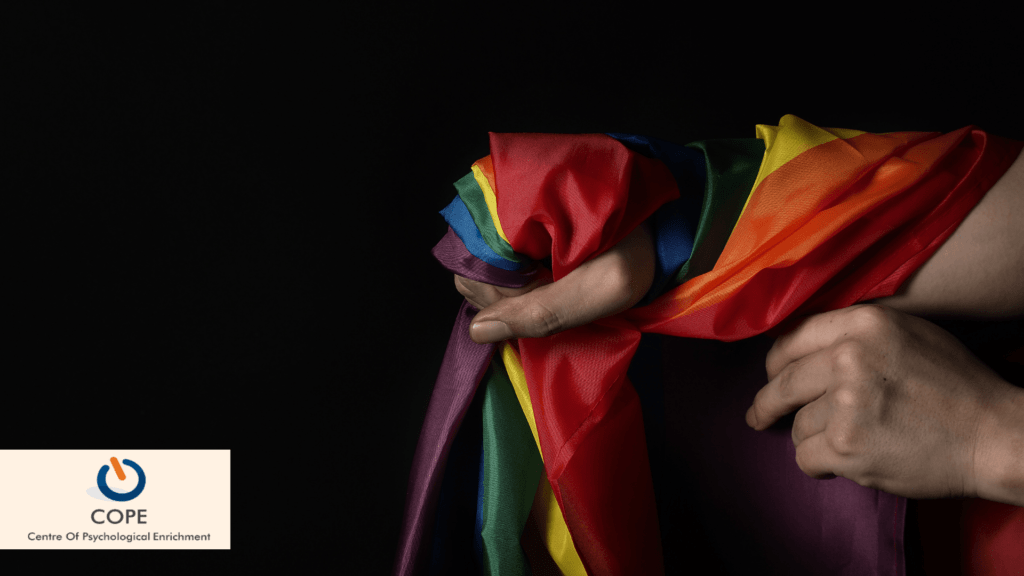LGBTQ+ stands for the lesbian, gay, bisexual, transgender, and queer community.
Globally, this community faces adversities in most aspects of their day to day lives.
LQBTQ+ Individuals are more likely to experience trauma than straight, cisgender individuals. This has a wide-reaching effect on their mental and physical well-being, relationships, and sense of identity.
Trauma in the LGBTQ+ community
Undoubtedly trauma is a common experience shared by many. Even more so in the LQBTQ+ community. Statistically, 85.2%aged 16+ are victims of harassment due to their sexual orientation and gender expression. Instances of this include:
- Verbal, physical or sexual harassment
- Bullying and discrimination
- Institutional and occupational discrimination
- Societal stigma and community violence – commonly referred to as ‘hate crimes’
The effect on mental health
General impacts
As a matter of fact, there’s a link between traumatic events and behavioural difficulties.
In children, this may manifest as social discomfort and rebellion.
For adults, this may manifest as maladaptive behaviours and coping styles: I.e substance addiction, risky sex, and unlawful conduct.
These behaviours and habits worsen the support system. This again triggers feelings of loneliness and isolation, as well as stress and anxiety. Thus the maladaptive loop of behaviours continues.
Furthermore, individuals with traumatic histories are more likely to develop chronic illness conditions. I.e. digestive issues, diabetes, hormonal imbalances, and risk of cardiovascular disease. further contributing to psychological distress.
Post-traumatic stress disorder (PTSD)
PTSD is not only common within the LGBTQ+ community but also 3x higher than in the remaining population. Instances of PTSD triggers within LGBTQ+ can begin in adolescence with bullying and social alienation. Later, these triggers often shift to hate crimes, abuse, and systemic discrimination by policies and politics.
Individuals oftentimes get scared by these triggers. As a result, they react with unhelpful coping strategies trying to maintain perceived safety. Ultimately these lead to disengagement, isolation, loss of motivation, and poor daily functioning.
Suicide and trauma in the LGBTQ+
Not only does trauma impact a person’s mental health. Long exposure to trauma also can have drastic effects on levels of stress, anxiety, depression and panic.
According to the Substance Abuse and Mental Health Administration (SAMHA), LGBTQ+ adults are twice as likely to experience these trauma responses compared to the heterosexual cisgender population.
As a result, this can trigger suicidal tendencies. According to recent studies, 46% of LGBTQ+ adults have contemplated suicide. Further 40% have made suicide attempts in the past. That displays how deeply rooted trauma is within the community.
The impact of early discrimination on later life
Past experiences of discrimination and trauma compound new experiences. This scheme increases anxiety about future scenarios and potential safety – or lack thereof. While this anxiety is protective, it is also exhaustive. It contributes to significantly higher levels of stress, generalised anxiety, and depression.
Being a victim of sexual/gender-based discrimination has a significant impact on the sense of self.
This can contribute to the experience of unstable identity or identity crisis later in life. As a result, it is harder for individuals to establish security and assurance within themselves.
Furthermore, early experiences of discrimination and trauma inform adult attachment styles within relationships.
A child who was shamed and shunned for their sexual presentation is likely to develop insecure attachment styles within adult relationships. These are connected to learned fears of intimacy, closeness, and trust.
Healing from past traumas
Healing complex trauma takes time and may take multiple different strategies to find what works best.
To name just some examples:
- Rallying support from peers and family
- Collaborating with other members of the LGBTQ+ community
- Learning to embrace self-care and self-love
Sometimes you can not heal traumas yourself and need help to cope. Then you always have the possibility to seek help from a mental health professional.
[dt_gap height=”30 /]
By Kristen Buck
References:
Trauma & the LGBTQ Community: An In-Depth Look | NMW Recovery (nomatterwhatrecovery.com)
Trauma and LGBTQIA+ Communities: What to Know | Psych Central
LGBTQ_MentalHealth_OnePager.pdf (suicidepreventionlifeline.org)
